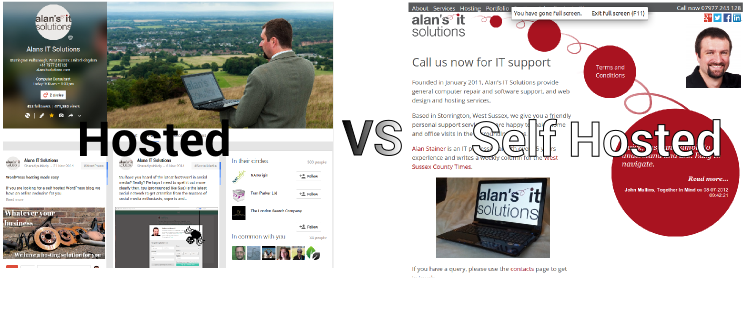What do we mean by self hosted and hosted?
Hosted simply means someone else takes care of everything for you, usually via cloud services. Whoever the host is retains ownership of the website. For example, WordPress.com, Blogger and all social media sites fit into this category. You probably will never know what server your site sits on, or where that server is.
Self hosted puts you in control of the website. You aren’t limited to a set of templates laid down by a third party. This doesn’t mean you have to be a web developer yourself, but you could easily employ one to do whatever you need. The server and the host is entirely your choice. You could even host it yourself on a computer in your house if you know what you are doing.
Hosted sites
If you are a small business, you might consider using a hosted service for your very first website. That could be a Facebook page, a Google+ page, a Blogger or WordPress.com site or one of the multitude of other hosts out there.
As I said up above, you are limited in what you can do when choosing a hosted service. If you don’t like the options they give you, you are out of luck. Perhaps you want to have some custom code added? What about changing the menu style or position? What about a completely custom page or pages? Some of these things may be possible, but it depends entirely on the host and what they give you. Usually you will be able to customise some things, but only in as much as you are given a list of options to choose from.
The best thing about using hosted services like this, is that they are mostly free. So if you are struggling to pay the bills, you don’t need to worry about the cost. You may find that “free” comes with a condition. The host may insist that to remain free, you need to have their advertising on your site. Hosted sites make it hard to make something truly unique, which is a problem if you are trying to establish a brand image.
Now one thing to watch out for with hosted sites, is that the host can shut you down if they wish and sometimes without warning. Additionally if the host goes bust there is very little you can do and the likelihood is that you will lose your site and your content forever.
Self hosted sites
As I mentioned, technically you can host a website on your PC or server at home. I do this myself for testing or building new websites. It is fine if your website is a casual or non business critical site and you don’t really mind the odd bit of downtime here or there. However, if you are running a business you seriously need to consider using an external host. If for no other reason than stability. Hosting companies very rarely suffer downtime and have extra measures in place to prevent it too. For instance, they will have multiple links to the outside world, so that if one goes down, they will still be accessible. Depending on the type of hosting, they may have multiple servers working in tandem to remove single points of failure.
All of this costs money of course. The good thing is, it doesn’t have to cost you a lot. Take our own website hosting as an example. There are a range of options available, with the cheapest costing less than a cup of coffee per month. Whether you use us, 123-Reg or one of the others, you will find you can start small and scale up as your site becomes more popular.
Unless you have gone to the expense of having a website made for you, the chances are that you will be looking at using a content management system of one variety or another. Most hosts will offer you various options for installing the most popular content management systems with a single click, or (because you have the option) you can do it all yourself manually by uploading files via FTP, etc. We have several one click install options ourselves (like Drupal, Joomla! and OpenCart) and if you choose the WordPress hosting option, you don’t even need to do that!
One you have a self hosted website, it is yours to do with as you wish. You can modify it, replace it, post whatever you like, host adverts and make back ups. You can move it to another host if you need to. For instance, if your existing host goes bust, you can simply move your site to a different one.
So which is right for you?
The answer really depends on you. What do you need and what does your business need? For me, I have a self hosted site, but I also maintain a presence on hosted services like Google+. That has allowed me to use not one, not two, but three separate content management systems on this site, to make it exactly what I need. My activity on services like Google+ and Twitter work with my site rather than against it, by improving visibility and bringing in more traffic.

